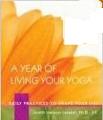A book of daily aphorism, spoken by
Judith Hanson Lasater
over thirty years of Yoga classes
and jotted down by her faithful student and scribe Kathy Vasquez.
Lasater adds a suggestion of how to put each aphorism into practice.
Light-handed, unpreachy, and delightful.
| Day
| Aphorism
| How to apply the aphorism to your life
|
| January 1
| "Living well is not about being calm; it is about being present."
| "For five minutes today, practice just being present with your emotions
without reacting to them.
Notice how they come and go."
|
| February 2
| "Being ourselves is what others really want from us."
| "Wholeness is found not only in the special moments of being lost in an
exquisite sunset or feeling the perfect balance of stillness in meditation.
Every moment of your life can be just as whole if you allow it to be so.
Today find the treasure in the most mundane moments.
How did it go?"
|
| March 3
| "To understand union, you must understand separation."
| "Union with another can only occur when we fully occupy
our place in the world.
Let yourself expand to fill your place,
so that they coming together with loved ones can be that much sweeter."
|
| April 5
| "Believing I am right fuels separation and anger."
| "Righteous anger is redundant.
I can never be angry when I accept that I am wrong.
Today when you feel irritated or angry,
pause and identify the thought that fuels your belief in your rightness."
See also April 2007 blog.
|
| May 4
| "To change the body affects the mind."
| "When we change the body, we affect the mind,
whether by asana, breathing, or meditation.
Before you practice, spend some quiet moments noticing the state of your mind;
at the end of your practice do the same."
|
| June 5
| "Growing old is not a mistake."
| "We live in a youth-oriented culture.
We are given the message that growing older is to be avoided.
Today celebrate your age, whatever it is.
(If it's your birthday, Happy Birthday!)"
See also June 2007 blog.
|
| July 10
| "Standing on your own two feet is the most important
asana."
| "Stand on your yoga mat and stand in
Tadasana
(Mountain pose).
Make your feet parallel,
ask your thighs to roll inward,
slightly lift your breastbone, while slightly dropping your chin.
Like a mountain, root your feet into the earth,
but let your heart soar to the heavens.
Breathe five slow breaths.
Now take this openhearted rootedness in your life."
|
| August 11
| "Being curious is a high state of being."
| "When you are curious, you're not sure you know,
you're a little empty,
and you're willing to learn.
These qualities bring you into the present.
And being present is at the heart of practicing yoga.
What are you curious about today?"
|
| September 4
| "Despair is anger turned inward."
| "Despair is an emotion built on thoughts.
The next time you are feeling down about your life,
ask yourself this question:
Am I feeling trapped, as if there is no choice in my situation right now?
Thinking you are stuck can stimulate and contribute to depression.
Get up and go for a brisk fifteen-minute walk right now.
Focus on the myriad choices life actually offers you."
|
| October 14
| "We are attached to difficulties."
| "Our tendency is to focus on what is wrong with a pose.
What can you celebrate in this pose today?"
|
| November 1
| "Don't confuse ambition with discipline."
| "Discipline is not supported by ambition but by consistency.
When you practice yoga today, focus on consistency and not on
forcing yourself to do more,
just for the sake of your ego."
|
| December 27
| "A healthy ego is not the problem;
attachment to what ego wants is the problem."
| "Spend a few minutes today contemplating the difference between ego
and egoism. A healthy ego creates your ability to have clear boundaries;
egoism is an unhealthy attachment to having it your way all the time."
|



